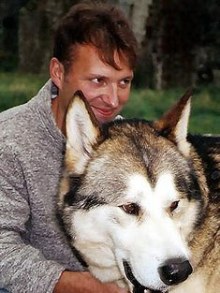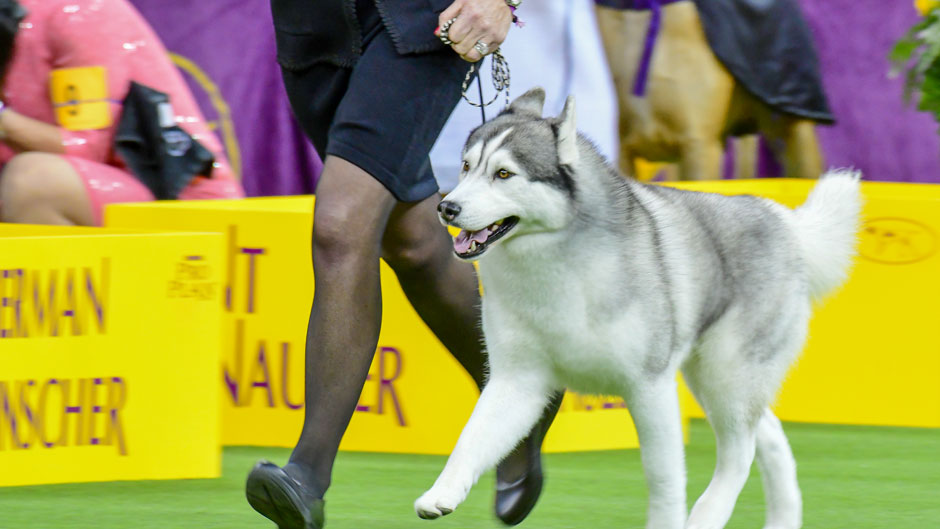As the 143rd Westminster Kennel Club Dog Show crowned the nation’s top dog selected by judges from a yapping and preening pool of 3,000 dogs, it is easy to forget humans’ “best friend” evolved from the wolf thousands of years ago. To the casual observer there is an ocean of time and breeding between a Canis lupus and a lhasa apso, but at the heart of every four-legged fur buddy beats the heart of a hunter.

Mark Rowlands, a University of Miami professor of philosophy, observed the special bonds between people and animals in his international bestseller memoir, The Philosopher and the Wolf: Lessons from the Wild on Love, Death, and Happiness (Granta, 2008), which chronicled his incredible relationship with Brenin, a wolf-dog cub he adopted and raised. Rowlands, whose research focuses on the philosophy of the mind, shared some wisdom on wolves and our special relationship with our pets.
When and why did wolves become domesticated?
No one is exactly sure of when, where, or why. With regard to where, there is some fairly substantial evidence of different waves of domestication—wolves became dogs more than once—in different places: Asia first, followed by East Asia and then Eurasia. Estimates of when these occurred range from 14,000 to 40,000 years ago.
Today, probably the most popular answer to the “why” question is the “survival of the friendliest” explanation. Wolves started scavenging trash left around early human settlements. This brought them into close proximity with humans. Some wolves tolerated this better than others, and this tolerance had a genetic basis. Those of high tolerance—the least aggressive/most friendly—accrued all the benefits of being able to scavenge from humans. Their low aggression/high friendliness genes were passed on to to their offspring, and were selected for over time. In other words, we didn’t domesticate wolves; they domesticated themselves.
How genetically different are modern dogs from their wolf ancestors?
Essentially identical. That’s why Canis familiaris (as the dog used to be known) became reclassified as Canis lupis familiaris. The wolf is Canis lupus. In other words, they are the same species, with the dog classified as a sub-species of the wolf (which is ironic given that there are now so many more dogs on the planet than there are wolves—self-domestication was a spectacularly successful evolutionary strategy). There are small genetic differences, of the sort you would find within a given species. In particular, there are three variations on chromosome 6 that are consistently different between wolves and dogs. These are known as WBS genes. WBS stands for Williams-Beuren Syndrome. Humans with this syndrome are hyper-social, being inordinately interested in others and forming bonds very easily. Dogs are a little like wolves with Williams-Beuren Syndrome. This supports the “survival of the friendliest” explanation of domestication.
Many of us consider our dogs and cats family. Do our pets makes us more “human?”
It depends what you mean by “human.” If what I said in The Philosopher and the Wolf is right, they make us less human. That is, they make us less scheming, manipulative, and deceitful. My unflattering estimation of humanity aside, I think pets make us better (not the same as being more human) because when a living being is totally dependent on you for its well-being, you realize, viscerally rather than merely intellectually, that not everything is about you.
What can animal studies teach us about human society?
Animals, Claude Levi-Strauss once said, are good to eat and good to think. The former pleasures have long been denied me, essentially by myself, a protracted exercise in self-denial. So, I have to content myself with the latter. I do think that if you want to understand humans, animals are a good place to start. For example, I once wrote a book on whether animals can be moral (spoiler alert: they can), not just because I wanted to know whether animals can be moral but because I wanted to understand what it is for humans to be moral.
What’s your favorite breed and why?
I don’t like the idea of breeds because I don’t like the idea of breeding animals to look a certain way. It never ends well, and many breeds of dog have spectacular physical (and psychological) infirmities as a result. I’m somewhat happier with the idea of a dog being bred for a certain function. So, if we think of breeds in this way, I seem to be currently favoring shepherds of various sorts, since I have a great deal of respect for their combination of intelligence, self-control, patience, bravery and, it has to be said, aggression. A dog like this is only really happy when it’s working—essentially trying to be the best example of its kind it can be—and I enjoy working with them.

